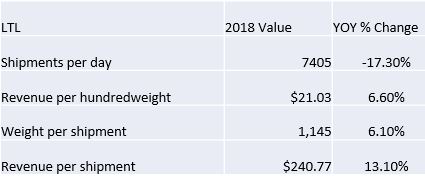
The second quarter Roadrunner Transportation Systems earnings release and the conference call that followed it reflected just how much the company has to go to recover from a series of accounting scandals over the past few years, but where it has made progress in reaching some of those goals.
“During the turnaround process, there will be bumps on the way, but we remain committed to long term and lasting improvements in each of our segments and our consolidated bottom line results,” CEO Curt Stoelting said toward the beginning of the earnings call, a sentiment he has expressed previously.
There were positives and negatives in the earnings report, though equity markets saw mostly the bad. Given how low Roadrunner stock is, it doesn’t take much of a move to send its percentage gains up or down by a significant amount. But on Wednesday, as markets headed toward the close, the stock was down 25 cts to $1.80, a 12.2% decline.
Among the positives in the earnings report:
- The Truckload & Express Services segment posted revenue of $300 million in the second quarter, up 14.1% from the prior year. Its EBITDA—which at this point for Roadrunner is an important metric, given all the extraneous costs it is picking up as part of its broader reorganization effort—was $10.1 million in the TES segment, up from $9.7 million a year earlier. Roadrunner’s slide presentation released in conjunction with the earnings call cited “improved volume and rates, partially offset by increased purchased transportation, equipment lease, maintenance and IT costs” as the reason for the gain.
- Adjusted EBITDA for the entire company was $6.7 million, down from $9.1 million a year earlier. But that occurred even as interest expenses rose to $34.2 million, up from $28.3 million a year earlier before it sold its Unitrans division. The higher interest expenses were associated with the preferred share payouts made to Elliott Partners, which by agreeing to purchase preferred shares earlier in the year gave Roadrunner’s capital base a significant shot in the arm, but at a steep interest rate. (In a separate SEC filing, Elliott Partners said it had extended until the end of the year the window for purchasing its commitment of preferred stock.)
- The progress being made on the company’s financials has allowed it to secure approvals for new equipment purchases from some of its OEM suppliers that will enable it to update its fleet. During the call, Stoelting said that “when it comes to (driver) recruitment, don’t discount the new upgraded equipment we will be putting in for company drivers and independent contractors. It’s a key recruiting and retention tool.”
- Roadrunner still sees itself on target to reach several goals by 2020. Stoelting said the optimism was not driven solely by the strong freight market, which he said he assumes will taper at some point. The adjusted EBITDA target for 2020, in those goals, would align with the company’s 2015 performance of a $2 billion revenue stream and adjusted EBITDA of $93.6 million.
- The LTL segment is implementing its strategy to drop lanes and services that aren’t profitable. Mike Gettle, Roadrunner’s COO, said the “near term” goal of the LTL group “is not to have a strong top line revenue growth but really to cycle out come of the less desirable freight and bring in new freight to replace that. We’re having good success at that, and we think we will build that as time goes on.” Sequentially, the EBITDA loss at LTL of $2.8 million was a $5 million improvement from the first quarter, but was down more than 23% from a year earlier.

- The Ascent Global Logistics segment posted total revenue increase of 15.6%, and a gain in adjusted EBITDA of 30% over the second quarter of 2017. Roadrunner executives cited not only the strong market but various technology changes and internal restructuring.
- The fact that the earnings release and analysts call took place when it did is a victory of sorts. Roadrunner has been cleaning up its books for months after the accounting scandals, and this is the first time in a long time that its earnings release aligned with most of the industry.
But there was plenty of red ink in the report.
- The net operating loss for the company rose to $11.4 million for the quarter from $7.5 million in 2017. But much of that are one-time expenses related to restructuring, which Roadrunner put at $8.6 million. A year earlier, the restructuring figure was $9.1 million. The operating loss in 2017 was also softened by $2 million in Unitrans operating income. That division has since been sold.
- The net loss rose to $42 million, up from $37.9 million. The company’s preferred stock payouts, along with reduced income tax benefits, were cited as the key reasons.
- The spread among contract drivers and independent contractors, and purchased transportation, is not what the company desires. Gettle said the second quarter’s capacity was about 48% employees/ICs, 38% purchased transportation and 16% intermodal. He added that the company history has seen that internal number as high as the low 60’s and Roadrunner would like to get back there.
Gettle was one of the few executives during this earnings season who said his company was seeing an impact from new tariffs put on by the U.S. “Right now I’d say our topline experience is more defined by uncertainty around tariffs,” he said. “Particularly on pork, we’re seeing less export activity to China and if you look at the import side, you see fewer steel imports.” He said those shifts have been more disruptive that competitor pricing activity.











